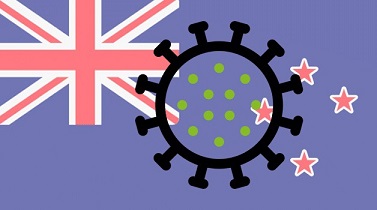COVID-19 Cases In New Zealand Still At Serious Levels Despite Decrease In Weekly Infections After Relaxation of Restrictions. 3484 New Infections, 22 Deaths
Thailand Medical News Team Aug 28, 2023 2 years, 3 months, 3 weeks, 2 days, 8 hours, 40 minutes ago
COVID-19 News: As the global battle against the COVID-19 pandemic rages on, the situation in New Zealand continues to evolve. Despite a recent decrease in weekly infections after the removal of all COVID-19 restrictions on August 15th, the nation still grapples with significant challenges. This
COVID-19 News coverages delves into the recent developments, the decision to drop restrictions, expert opinions, public sentiments, and the emergence of new variants.
 Weekly Infections and Deaths
Weekly Infections and Deaths
Over the past week, New Zealand has reported 3,484 new cases of COVID-19, accompanied by 22 further deaths.
https://covid19.govt.nz/news-and-data/covid-19-data-and-statistics/
A notable aspect of these new cases is that more than 40 percent were reinfections. Hospitalization remains a concern, with 157 individuals hospitalized and two in intensive care. Alarmingly, 43 individuals contracted COVID-19 less than 90 days after their previous infection. Despite the decrease in the seven-day rolling average of cases to 497, the situation is still a cause for concern when considering the overall health impact and the potential for further transmissions.
Dropping of COVID-19 Restrictions
On August 14th, Prime Minister Chris Hipkins announced the removal of all remaining COVID-19 restrictions, effective August 15th.
https://www.nzherald.co.nz/nz/politics/final-covid-19-restrictions-banished-as-experts-assess-future-approach/ASHXPJBYRVCBPKG5IBNV5WINA4/
The mandates that were scrapped included the mandatory seven-day isolation for those testing positive and the requirement to wear masks in healthcare facilities. The decision was made due to the perceived decrease in the public health risk compared to earlier stages of the pandemic. This move was seen as a significant milestone, marking the end of an unprecedented period of challenges and uncertainties.
Expert Opinions and Concerns
While the removal of restrictions was met with a sense of relief, it also sparked concerns and discussions among experts in the field. Otago University epidemiologist Dr Michael Baker emphasized the importance of individuals staying home when sick, even with the absence of mandates. He noted that COVID-19 has transitioned from a pandemic threat to an endemic infectious disease, necessitating continued vigilance. Experts like University of Otago epidemiologist Dr Amanda Kvalsvig expressed concern about the removal of all protections, highlighting the potential impact on vulnerable populations and stressing the need to maintain safety measures even when government policies change.
University of Canterbury professor, Dr Michael Plank presented a balanced view, stating that the decision to remove restrictions was reasonable, considering the overall situation. He acknowledged that COVID-19 is likely to persist and present future challenges, but emphasi
zed the need for a cautious approach and preparedness for potential waves.
Public Sentiments and Perspectives
The response from the public to the dropping of COVID-19 restrictions has been diverse. While some individuals expressed relief and a sense of moving beyond the pandemic, others raised concerns about the sudden relaxation of rules. Some citizens voiced apprehension about the potential for the virus to spread, indicating a preference for retaining certain precautionary measures. Others highlighted the importance of maintaining collective efforts to ensure public safety, even without government mandates.
Handling the Ongoing Situation
Despite the lifting of the seven-day isolation mandate for COVID-19 positive individuals, the Ministry of Health continues to encourage those with symptoms to stay home for five days. Additionally, wearing masks remains recommended, especially in healthcare and disability care facilities, to reduce the spread of respiratory illnesses. The Ministry emphasizes that returning to normal activities should be considered only after the recommended isolation period.
Emergence of New Variants
The ongoing threat posed by new variants of the virus cannot be ignored. Microbiologist and infectious diseases expert Dr Siouxsie Wiles expressed concerns about the decision to remove masking requirements, particularly in light of the emergence of a new sub-variant named EG.5. While the World Health Organization (WHO) categorized this variant as a variant of interest with low public health risk, it has become the dominant variant in the United States. New Zealand has also detected this variant, although its impact on the local situation remains closely monitored.
Conclusion
In New Zealand, the battle against COVID-19 continues with a nuanced combination of successes and challenges. Despite a reduction in weekly infections following the removal of restrictions, the nation remains vigilant against the persisting threat. Expert opinions vary, highlighting the need for ongoing efforts to protect public health. As the country navigates this evolving landscape, careful consideration of expert advice, individual responsibility, and collective action will remain crucial in the ongoing fight against the pandemic and its variants.
For the latest
COVID-19 News, keep on logging to Thailand Medical News.
